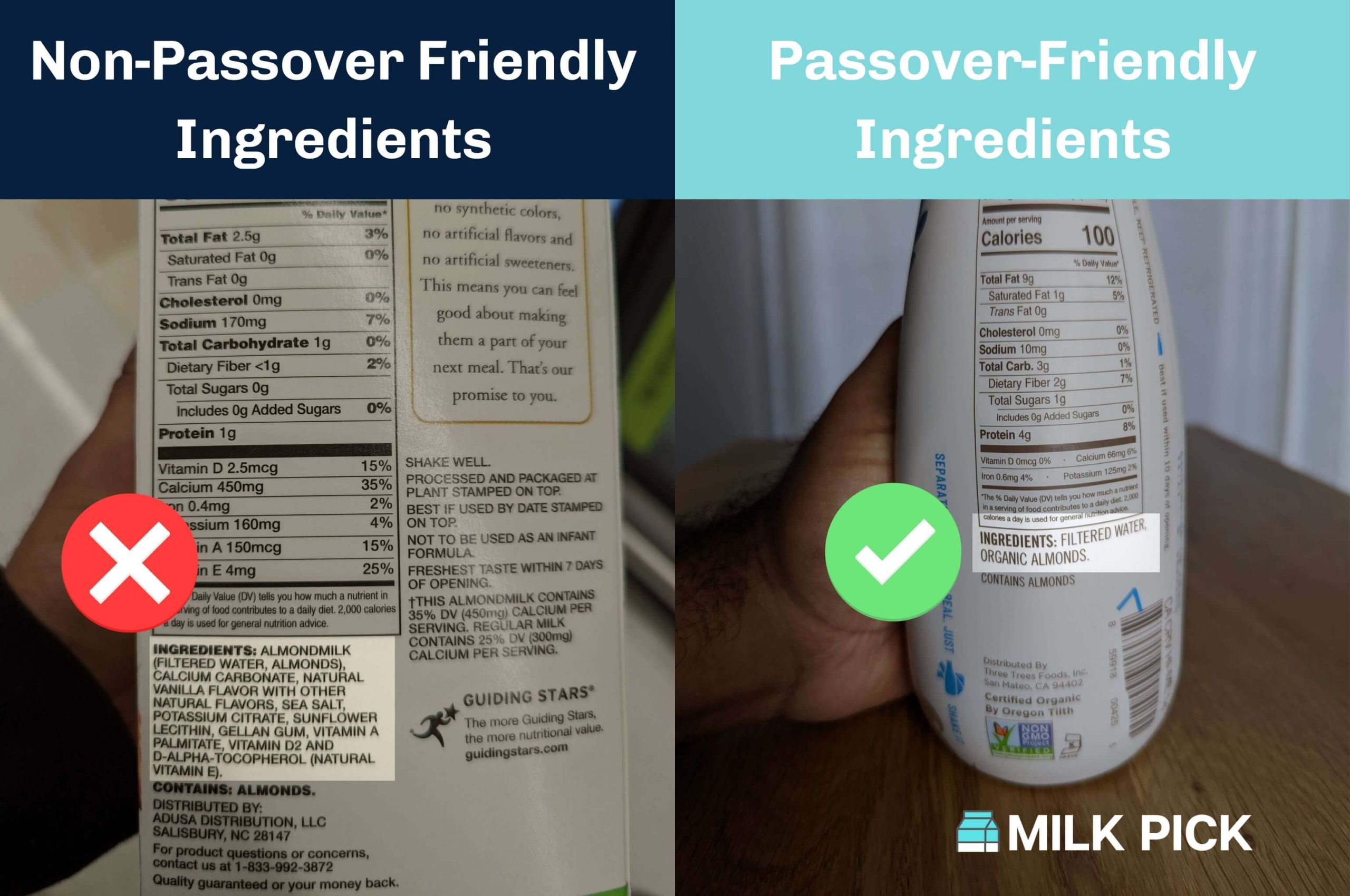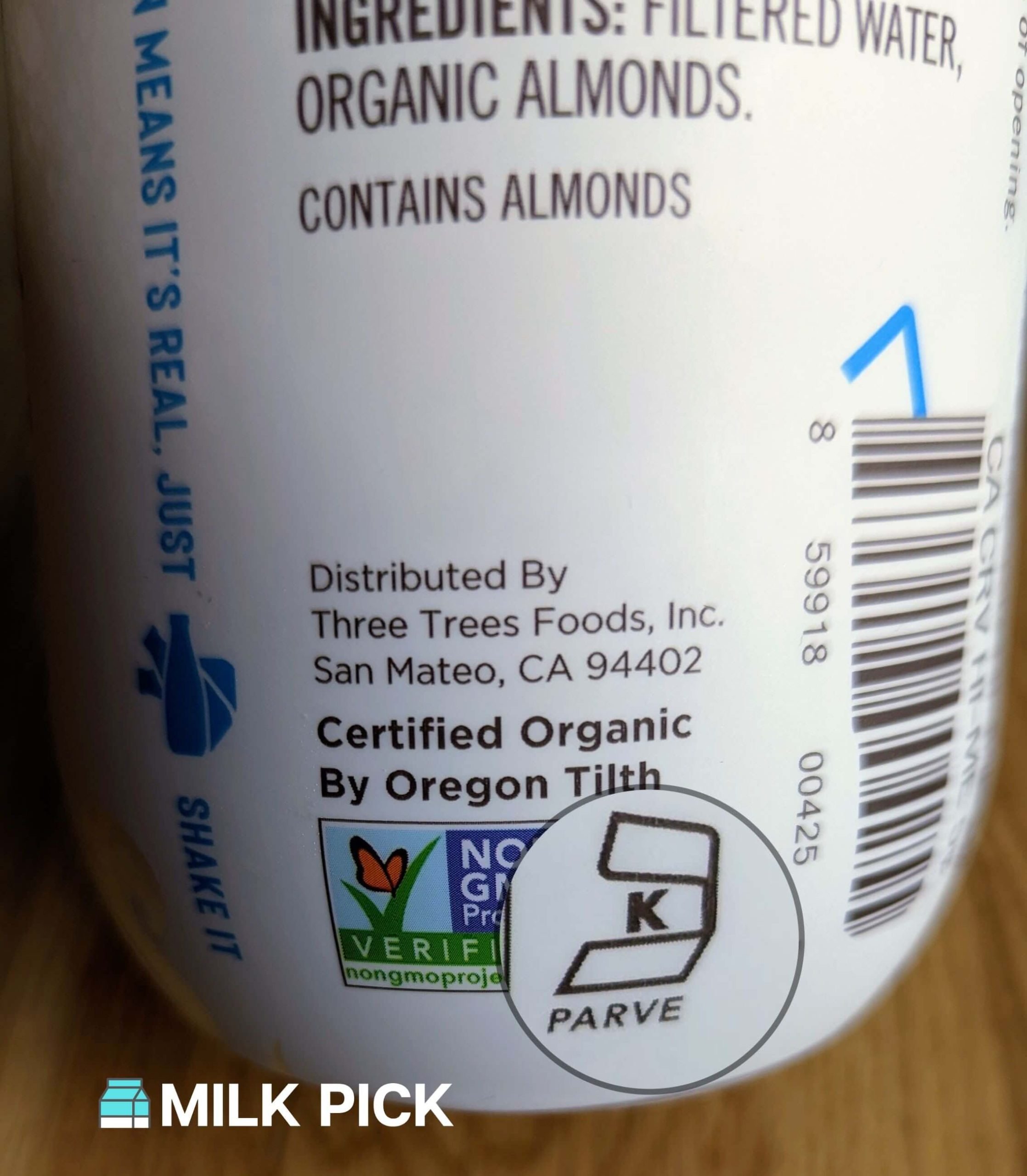Celebrating Passover is a tradition for most Jewish people in America. According to a poll done by the Pew Research Center, nearly 70% of Jews in the U.S. attend a Seder, a ritual ceremony and accompanying meal, during Passover.
Jewish food law, or the kashrut, is vital to Judaism year-round, but it is especially important during Passover.
When celebrating the holiday, you must eat foods that fall under kosher guidelines, such as avoiding consuming meat and dairy products together.
However, Passover’s food requirements are even more strict, so understanding what you can and can’t eat is important for celebrating the holiday.
Learn more about what foods are allowed during Passover, including whether you can drink almond milk instead of dairy milk at Seder or during the rest of the holiday.
Quick Answer
Can you drink almond milk during passover?
Yes, almond milk is ok to drink for passover if it is made with kosher ingredients and processed in a facility that doesn't make rice, pea, or soy milk (if you don't consume kitniyot).
Is Almond Milk Ok To Drink For Passover?
In theory, almond milk should be okay to drink for Passover. The plant-based beverage is made from tree nuts, which fall under kosher guidelines and do not break Passover-specific chametz or kitniyot rules.
However, depending on how strictly you adhere to Passover consumption guidelines and your Jewish faith (Ashkenazi or Sephardic), you must look more closely at your almond milk to ensure it is allowed during the holiday.
For example, almond milk processed in a facility that manufactures milk made with chametz (such as oat milk) might not be acceptable to drink during Passover.
Similarly, if you do not consume kitniyot during Passover, you’d want to avoid almond milk processed in a facility that makes rice, pea, or soy milk.
All three ingredients are not allowed during the holiday, and your almond milk would likely have come into contact with them during the manufacturing process.
Additionally, almond milk may contain additives that are not considered kosher or Passover-approved. Any almond milk with the following additives should be avoided at Passover:
- “Flavors”
- Corn syrup
- Vanilla extract or paste (vanilla extract often contains alcohol made from chametz, and vanilla paste often contains corn syrup)
- Soy or sunflower oil (sunflower seeds are kitniyot)
- Soy or sunflower lecithin
- Sugars or sweeteners - pure sugar is okay for Passover; however, it is difficult to know whether a manufacturer uses a non-approved sugar/sweetener made with kitniyot ingredients
For example, if you purchase almond milk at the grocery store, many brands you find there will not be okay to drink during Passover, even those that may bear Kosher certification.
If the ingredient list contains any of the above additives, you must avoid it during the eight days of the holiday.

What Type of Almond Milk Can You Drink At Passover?
There are a few types of almond milk you can drink at Passover. These include homemade almond milk and Passover-approved almond milk brands.
Homemade
Making your own almond milk at home ensures it doesn’t contain chametz or kitniyot ingredients.
To make almond milk, buy raw almonds and soak them in water overnight. Remove the skins (optional) and set them aside.
Then, blend the almonds and water and strain the mixture into a sealable glass container.
This Passover-friendly almond milk should last for about 3 to 5 days in the refrigerator, so plan on making two batches over the week to last the entire holiday.
Passover-Approved
Your safest option when buying almond milk for Passover is to get it from an approved source.
Rabbinic agencies like K-Star offer guidance on foods that are okay to eat and drink during Passover.
Some have searchable databases or printable guides that can help you find Passover-friendly foods.
Use the following resources to find approved almond milk brands for Passover:
- OU searchable database (click the Passover box and search for “almond milk”)
- Google search using the phrase “kosher for Passover almond milk”
- K-Star Passover guide
- Kashrut.com Passover guide
- OK Kosher Passover guide
- CRC Passover guide
Some organizations specify approved brands and products for people with special dietary needs.
For example, OU Kosher states that Almond Breeze Original, Rice Dream Classic Original, and Soy Dream Original Enriched in shelf-stable containers are okay for those with certain illnesses and require milk alternatives.
Lieber’s Supreme Almond Milk is one of the most widely-recognized Passover-approved almond milk products.
What is Passover?
Passover (Hebrew “Pesach”) is a Jewish holiday celebrated for 7 or 8 days starting in late March or early April each year, depending on the religious calendar.
The holiday is celebrated to commemorate the liberation of the Hebrews from slavery in Ancient Egypt.
According to the story of Exodus in the Torah (the first 5 books of the Christian Bible), Pharaoh had enslaved the Hebrew people and ignored God’s warnings to let them go.
After a final warning, God sent a plague to kill all firstborn Egyptian sons. However, to spare the Hebrews, he commanded them to put the blood of a lamb on their doors.
When the plague came, it passed over their homes (this is where the name Passover originates).
Upon the death of his son, Pharaoh finally consented to free the Hebrews; however, they left quickly, taking unleavened bread as their only source of food.
The Passover holiday, also called The Festival of Unleavened Bread, remembers this time in Hebrew history beginning with a meal called a seder.
During the seder, Jews eat special foods that symbolize the Hebrew’s liberation. These foods follow strict dietary laws under normal kosher guidelines, with additional rules specifically for Passover.
For our visual friends, here's a video from Inside Edition with more details about this Jewish holiday.
What Foods Can You Eat During Passover?
If you practice Judaism, you can eat and drink certain foods for Passover.
You must observe standard kosher guidelines during the holiday, including:
- Not eating meat and dairy together
- Avoiding restricted foods like pork, shellfish, or seafood without fins or scales
During Passover, you can generally eat the following foods:
- Any fruits and vegetables (except kitniyot, which is discussed below)
- Any fruits
- Meats, like chicken, beef, fish, and turkey that are processed according to kosher guidelines
- Kosher-certified processed/packaged foods
- Eggs
- Nuts and nut products like almond butter, flour, and milk
- Kosher cheese and yogurt
- Spices
- Bitter herbs
What Foods Are Prohibited During Passover?
For Passover, you must also follow special dietary restrictions. The most significant rule is to avoid eating foods with chametz.
Chametz refers to leaven (any ingredient that helps grain rise through fermentation, like yeast or sourdough) or foods mixed with a leavening agent.
Prohibited chametz include:
- Wheat, barley, oats, rye, and spelt if they have had more than 18 minutes of contact with water (this would cause them to rise)
- Sourdough
- Yeast
- Beer
This means that foods like pastries, pasta, bread, and crackers are prohibited during the eight days of Passover.
However, you can eat unleavened bread, called matzo, during the holiday.
Some Jews (Ashkenazi) also avoid kitniyot during Passover. These foods include:
- Millet
- Rice
- Corn
- Green Beans
- Dried beans and lentils
- Peas
- Peanuts
- Soybeans
- Mustard
- Sesame Seeds
Enjoy Homemade or Rabbi-Approved Almond Milk During Passover
While you may be able to find commercial almond milk brands that seem to meet Passover guidelines (such as JOI almond milk base or Three Trees organic almond milk), your best option during the holiday is to make your own almond milk or buy from a Rabbinic agency-approved source.

Most commercial brands, even those with Kosher certification, use non-Passover-friendly ingredients or come into contact with chametz or kitniyot ingredients, rendering them unfit for consumption during this time.
Following the strict dietary guidelines during Passover can require research and effort.
However, if you follow the Jewish faith, following Passover dietary rules helps you honor your ancestors' story and connect you to your spiritual beliefs.
